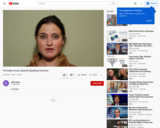
CC BY-NC
- Subject:
- Arts and Humanities
- Languages
- Material Type:
- Lecture
- Author:
- Sofia Duffy
- Date Added:
- 12/11/2020

CC BY-NC
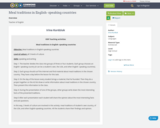
Teacher of English

In this version of bingo, each student has an answer that they share with the others when they exchange information. It allows students to learn as they complete the task.

Downloadable PowerPoint for the OER textbook Essential Communication Chapter 2

Lab to accompany textbook French 201
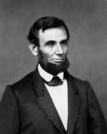
Over the next two lessons, students will complete the culminating assessment for this unit.In this lesson, students will read text and answer questions that reflect their reading comprehension. Some questions will ask students to select from a group of answers supplied. Other questions will ask students to construct their own answers and write them in the space provided.

This lesson plan is made to make sure students are comfortable. It helps you set the ideal environment for learning. -Howard Nutt
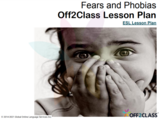
Fears and PhobiasThis lesson plan is designed for upper-intermediate students and introduces new vocabulary related to fears and phobias. You should prompt students to talk about what scares them using the questions and vocabulary provided.If you want additional lesson plans and support, including teachers’ notes, be sure to register for a free Off2Class account.
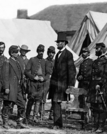
In this lesson, students will continue analyzing Lincoln’s first inaugural address. They’ll read two more of his speeches, including the Gettysburg Address. Then, they’ll analyze his themes and the ways that he used literary and rhetorical devices.
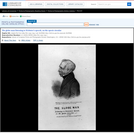
A small, bust-length caricature of Washington "Globe" editor and Van Buren adviser Francis Preston Blair. The print was probably issued in the spring of 1838. In May of that year the Specie Circular, an extremely unpopular order issued by the Jackson administration in December 1836, directing collectors of public revenues to accept only gold or silver ("specie") in payment for public lands, was repealed. The print's title may refer to Daniel Webster's lengthy March 12 speech condemning the Independent Treasury Bill and other aspects of President Van Buren's fiscal program. The print may to be a companion piece to "The Globe-Man After hearing of the Vote on the Sub-Treasury Bill" (no. 1838-4). Both are probably attributable to Napoleon Sarony on the strength of their marked resemblance to Sarony's characterization of Blair in "A Globe to Live On!" (no. 1840-42).|Entd . . . 1838 by H.R. Robinson . . . Southern District of N. York|Printed & pubd. by H.R. Robinson, 52 Cortlandt St. N.Y.|Probably drawn by Napoleon Sarony.|Title appears as it is written on the item.|Weitenkampf, p. 54.|Forms part of: American cartoon print filing series (Library of Congress)|Published in: American political prints, 1766-1876 / Bernard F. Reilly. Boston : G.K. Hall, 1991, entry 1838-3.

Do you have an idea for improving this content? We’d love your input.

This lesson opens the unit and prepares learners for the structure of the instructional routines. The anchor text for this lesson is, Words Set Me Free by Lesa Cline-Ransome. This literary nonfiction text chronicles the story of Frederick Douglass' early life and includes events that influenced both his life and those of others. The students should listen for examples of how actions speak louder than words. The initial read will allow students an opportunity to comprehend on a literal level. The subsequent readings provide opportunities for students to analyze and interpret figurative language throughout the book. Specifically, the students will identify how similes and metaphors enhance the reader's understanding of the life of Frederick Douglass. Students will routinely write in a response log to demonstrate understanding of the theme of this unit, Actions Speak Louder than Words. In addition, students will use their knowledge of figurative language in their writing.

Do you have an idea for improving this content? We’d love your input.

Do you have an idea for improving this content? We’d love your input.

This curriculum was designed to improve the quality of care provided to children in out-of-home care. It highlights the importance of providing child welfare services that are more responsive to the voices of children in kin and non-kin foster care. Components include an overview of the child welfare system in California, a literature review of children's experiences in out-of-home care, children's experiences with kin and non-kin foster care in California, adolescents' perspectives of out-of-home care in California, practice tips for child welfare workers, case vignettes, and a bibliography of relevant child welfare texts and articles cited in the curriculum. (348 pages)Fox, A., Frasch, K., & Berrick, J. D. (2000).

Do you have an idea for improving this content? We’d love your input.

Do you have an idea for improving this content? We’d love your input.

This resource is a video abstract of a research paper created by Research Square on behalf of its authors. It provides a synopsis that's easy to understand, and can be used to introduce the topics it covers to students, researchers, and the general public. The video's transcript is also provided in full, with a portion provided below for preview:
"Communication is key to business. If employees don’t communicate ideas or point out problems, organizations can struggle to improve efficiency and offer innovative products and services. That’s why leaders and organizations often encourage workers to voice their ideas and perspectives. If employees speak up and express their ideas and opinions, the thinking goes, then they’re not remaining silent about other problems or concerns. It turns out, that’s not the case. In an Academy of Management Journal paper, researchers analyzed multiple studies involving thousands of employees to understand the link between voice (how often employees volunteer constructive ideas or issues at work) and silence (the extent to which they intentionally withhold ideas or issues). The conclusion was that the two behaviors were virtually independent. The research found that voice and silence are driven by different psychological factors..."
The rest of the transcript, along with a link to the research itself, is available on the resource itself.

Learning Framework: Effective Strategies for College SuccessChapter 10: Active Listening in the Classroom
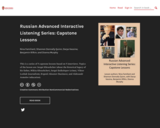
Short Description:
This is a series of 5 capstone lessons based on 5 interviews. Topics of the lesson are: Sergei Khrushchev (about the historical legacy of his father, Nikita Khrushchev), Sergei Enikolopov (crime), Viktor Loshak (journalism), Evgenii Aksenov (business), and Aleksandr Asmolov (education).
Long Description:
This is a series of 5 capstone lessons based on 5 interviews. Topics of the lesson are: Sergei Khrushchev (about the historical legacy of his father, Nikita Khrushchev), Sergei Enikolopov (crime), Viktor Loshak (journalism), Evgenii Aksenov (business), and Aleksandr Asmolov (education).
Authors: Nina Familiant, Shannon Donnally Quinn, Benjamin Rifkin
New version created by: Shannon Donnally Quinn with help from Lidia Gault
Word Count: 4544
(Note: This resource's metadata has been created automatically by reformatting and/or combining the information that the author initially provided as part of a bulk import process.)